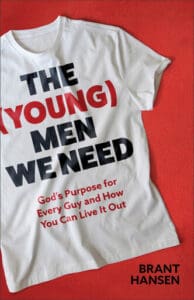
Better Ways to Communicate With Your Spouse
In a discussion based his book With These Words, Pastor Rob Flood and his wife, Gina, offer insights on several key communication skills that have healed and revolutionized their once-troubled marriage.
Today, an expectant mother faces a life-and-death decision. Will you help save her baby’s life? Double your gift to help save babies from abortion through a $1.1 Million Match Opportunity!
Rescue 2x the babies from abortion!
Home » Episodes » Focus on the Family Broadcast » How Young Men Can Cast a Bigger Vision
Brant Hansen: … But unfortunately, in church culture, I would say, we kinda just default to, “Well, just stand up, be a man.” W- but what is that mean? Like, specifically, what’s a beautiful specific vision?
John Fuller: Well, that’s Brant Hansen. He’s our guest today on Focus on the Family with Jim Daly. He’s gonna help us understand God’s great plan for young men and how important they are for us, uh, as a society and culture. Thanks for joining us. I’m John Fuller.
Jim Daly: John, it seems today that so many young men are aimlessly wandering maybe, uh, through gaming or, literally, just wandering-
John: Huh.
Jim: … uh, through the streets, (laughs) you know, “What to do? What do we do?” It’s an epidemic and it- it is a sense of purposelessness.
John: Mm-hmm.
Jim: And, uh, I think today we’re gonna hit this topic with a great guest who’s written a wonderful book, The Young Men We Need, and, uh, you know, as, uh, a father of two young men, I’m really interested in what we’re gonna talk about.
John: Yeah, I’m learning in as well, and, uh, Brant Hansen is a syndicated radio host on more than 200 radio stations. Uh, he’s the author of a number of books, and as you said, Jim, the one that’s gonna form the foundation for our conversation today, The Young Men We Need: God’s Purpose for Every Guy and How You Can Live It Out, and, uh, stop by focusonthefamily.com/broadcast for all the details about Brant and the book.
Jim: Brant, welcome back to Focus. It’s good to have you.
Brant: Thank you. I’m always honored to talk to you guys.
Jim: It’s always fun to see you.
Brant: Thanks.
Jim: And you- you know, I love your writing style, and it’s just- it’s real fresh and it’s raw and it’s right out there and you do a great job articulating ideas.
John: Mm-hmm.
Brant: Thanks. I try to write in a funny way but that’s always in the eye of the beholder to, like-
Jim: Yeah. (laughs) That’s the truth.
Brant: … what may be funny to me may not … but sometimes it works.
Jim: Let’s start with the Scripture. We’re Focus on the Family.
Brant: Mm-hmm.
Jim: I mean, that’s our core, is our commitment to Christ, and we think everything is built upon that, the family, everything.
John: Mm-hmm.
Jim: Uh, but you look at Psalm 119:9. It says, “How can a young man keep his way pure? By guarding it according to Your Word.”
Brant: Mm-hmm.
Jim: Uh, that’s pretty mu- that’s it, isn’t it?
Brant: It is, and, uh, but guys aren’t told who they’re supposed to be.
Jim: Hmm.
Brant: They’re not.
Jim: What do they hear in the culture? What a- what are they supposed to be with air quotes?
Brant: T- well, that’s just it-
Jim: Yeah.
Brant: … there’s no- there’s no actual vision for it, but there’s … the larger culture has no clue and won’t articulate any sort of specific thing about masculinity. We know that. Um, and- but the other thing that even a lot of Christian guys are going to is Andrew Tate.
Jim: Mm-hmm.
John: Yeah.
Brant: You know, if you don’t know much about him, like, he’s the just epitome of selfishness, using women. It’s exactly the opposite of what we would want to- to save it. Literally, in Christian schools, a lot of guys are bending towards that and they idolize them.
Jim: Why do you think that is? I mean, it’s an interesting inverse reaction to what we would hope for, obviously, but what- what’s creating that appetite in young men to go so kinda core and baseless?
Brant: They wanna know who the- who they’re supposed to be.
Jim: Yeah.
Brant: And he’s giving them a vision, and in the absence of a better vision, it’s something. I mean, guys want to know, like, “What is my mission?” Like, (laughs) “Who- who-
Jim: Yeah.
Brant: … am I?” And some of them will openly say that, like, “I’m following him because no one else is showing me any model,” but unfortunately, in church culture, I would say we kinda just default to, “Well, just stand up, be a man.”
John: Hmm.
Brant: W- but what does that mean?
Jim: Right.
Brant: Like, specifically, what’s a beautiful specific vision?
Jim: Let me ask you this too, though. I mean, in that regard, we hear a lot about the feminization of the church, you know, that men don’t feel comfortable, uh, so much going to church in the way that it’s structured.
Brant: Yeah.
Jim: It’s kinda like school. You gotta sit still and listen, and that’s not something we typically do well, even as adult males.
Brant: It isn’t- Right. It doesn’t resonate with a lot of young guys, and this is one of the things I write about, and I think it’s great news. I talk about your spiritual life. What does it actually look like? ‘Cause guys will, a lot of times, think that God has abandoned them or maybe He’s not real ’cause they don’t feel Him, like we’re supposed to feel feelings. I mean, (laughs) we’re- like, our whole culture’s based on emotions, but-
John: Mm-hmm.
Brant: … that seeps into church culture too.
Jim: And that’s not bad. I mean, e-
Brant: No. No, no, no.
Jim: … emotion is a good thing.
Brant: No, but for a lot of guys, and for some women too, it might be more analytical. If they’re not feeling it, you feel like you must not be spiritual.
John: Hmm.
Jim: Hmm.
Brant: I felt- that’s what I thought.
Jim: Yeah.
Brant: Like, I must not … everybody else is feeling something. A lot of young guys don’t get it. It doesn’t click for them.
Jim: Mm-hmm.
Brant: They’re not having that same experience in a worship service, and it’s not their fault. It’s just that real spirituality, when I’m trying to tell young guys, and they can get this, like, it’s not emotion. It’s loyalty.
John: Hmm.
Jim: Hmm.
Brant: That’s what’s God- that’s what God is looking for and always has been.
Jim: And that’s why an Andrew Tate is actually taking-
Brant: Yeah.
Jim: … because- or a Joe Rogan or-
Brant: Sure.
Jim: … you know, people that are speaking forcefully into male culture about being male.
Brant: Yeah. Just here’s a vision. They’re giving it. I think it’s a horrible one. It’s one that … it- it’s one that betrays what our real role is, what I try to sketch out in this book-
John: Hmm.
Brant: … so that … That’s the whole point of the book, is like, what is this specific vision that I can shoot for, and, uh-
Jim: Yeah.
Brant: … it’s a beautiful one. Like, it’s … the people around you will benefit from this. You don’t benefit from the, uh, Andrew Tate model, the people around you suffer.
Jim: Yeah. Yeah. Men have a fork in the road. Either you’re a taker or a giver, and how do you figure out-
John: Yeah.
Jim: … which is what you want to be-
Brant: Right.
Jim: … and, of course, the- the Word of God is about being selfless and giving of all kinds of things, talent, treasure, time-
Brant: Yes. So-
Jim: … family.
Brant: Yep. So, the vision I’m trying to sketch out is the idea of what Adam was given to do. He’s a keeper of the garden. That’s what he was supposed to do. He actually didn’t defend the garden against the enemy that was in it.
Jim: Huh.
Brant: He failed, but that was his job, and it means creating a space where the vulnerable can thrive-
Jim: Hmm.
Brant: … it means, uh, protecting people around you, it means, like, if you have a garden, there’s species that are vulnerable that can’t grow in the wild, but because you’re there, they get to bloom and flourish. Like, that- everybody’s got a garden, and this is your job. Your sphere of influence is the people around you get to thrive because you’re there and they’re protected because you’re there. They’re more secure, not less secure. See, around Andrew Tate, you’re less secure, but around a keeper of the garden, the people around you are more secure ’cause you’re there, and to the extent that you make them aware of that. They’ve- they’re- they become aware that you’re a point of security. They’re drawn to you.
Jim: Yeah, and that’s the big goal and we’ll- we’ll unpack that a little bit more.
Brant: Yeah.
Jim: Let’s start with toxic masculinity and what that means. I don’t know that many men understand what that means.
Brant: Well-
Jim: Somehow, I’m, uh, toxic.
Brant: Well, I think it’s … of course it’s- it’s thrown around, and that’s the problem. It’s, like, this one-size-fits-all thing and no one really knows exactly what it means, but I think there can be toxic masculinity to the extent that if you’re trying to be intimidating to innocent people, to vulnerable people-
Jim: Yeah, the bully thing.
Brant: Yeah. You- you make them insecure.
Jim: Yeah.
Brant: You- you make people feel insecure around you versus secure. At the deepest level, that’s what that is, I think. Conversely, um, there are counselor friends of mine who say they see more toxic masculinity in terms of what they call toxic passivity-
John: Hmm.
Brant: … where people feel insecure around a dad or a husband because they are afraid he won’t show up, and he doesn’t. He just doesn’t … he just has checked out.
Jim: Yeah.
Brant: So, it’s actually still toxic and it still makes people feel insecure, but it’s different.
Jim: I think- I think that’s a difficult one because I think men, when we feel under pressure, you know, in your marriage or w- work perhaps, you- we tend to back up. You know, it’s just one of our almost, like, instincts-
Brant: Yeah.
Jim: … is to get quiet, back up, let’s keep the peace, we don’t wanna rock the boat, however you wanna describe that, and that’s not healthy.
Brant: No, and that phrasing that they put on there of the toxic passivity helped me.
Jim: Yeah.
Brant: Tha- that’s true. I don’t want-
Jim: I like that.
Brant: … to check out like that. Like, my wife needs to know that I’m engaged, and if she suspects I’m not or that I wouldn’t rise to the occasion, or I- if I’m too quiet that I make her wonder, “Is he really … does he really love me? Is he …” That’s a problem.
Jim: Well, and then, you know, again, a therapist will start telling you that when you quiet down and you shut down, your wife’s gonna start prodding you on purpose to get some kind of response-
Brant: Yeah.
Jim: … ’cause you’re just so passive.
Brant: Yeah, and that’s-
Jim: So then, that’s not healthy.
Brant: No, that’s a- that’s a viscous cycle, but one of the things that, uh, struck me, I was (laughs) reading another book, and, uh, a guy said, “I can become the threat to my wife with my words.” Like, you could pat yourself on the back, like, “I’d defend against an intruder if he came in,” but-
Jim: (laughs)
Brant: … he said, “Most of the time, I’m the intruder. It’s my lack of words or my sarcasm.-
John: Hmm.
Brant: When I do talk, I cut her down. I’m the problem-”
Jim: Wow.
Brant: … he said.
Jim: Yeah.
Brant: So, I think there’s something to that, but on both of those ends, the problem is you’re making people around you less secure-
Jim: Yeah.
Brant: … but if you exude security and your wife doesn’t have to worry about … I tell young guys this, like, “This is your … If you get married, your wife’s gonna want you to be a focus of security, a provider of security, and if you’re not, she’s gonna resent you, but if you are, she’s gonna find you wildly attractive.”
Jim: (laughs)
Brant: It’s really true.
Jim: There’s a secret.
Brant: Yeah.
Jim: (laughs)
Brant: I mean, that- that’s a way to get guys’ attention, but it’s-
Jim: Yeah.
Brant: … it’s not the reason to fulfill this keeper of the- of the garden idea, but if I’m talking to young guys, like, “You do understand, women will find you more attractive if you’re a source of security-
John: Mm-hmm.
Brant: … and they see you that way. Like, just so you know, because they deeply know, deep down, this is what you’re for.”
Jim: Yeah, and it’s a core need-
Brant: Yeah.
Jim: … for everybody, actually. So, the question becomes, the golden question here, halfway in, a third of the way in, how can a young man take initiative to be keepers and protectors in their respective gardens?
Brant: Yeah. The thing I start with, um, is that thing I said about the spiritual life. Like, first of all, God is looking for loyalty. So, you just keep showing up and talking with Him. I’m telling guys, “He wants to partner with you in life. He’s always been looking for partners. Abraham, Adam and Eve. Like, it’s- He’s looking for part- He’s looking to partner with you, so you just keep talking to Him, you keep showing up. Even if you sin, and you are a sinner, you still show up. You don’t slink away in shame.”
Jim: What does it mean to partner … I mean, sometimes we can over-complicate that.
John: Hmm.
Jim: I think God, the older I get, the more I realize the simpler it is.
Brant: Yeah.
Jim: And we can over-complicate that. That means I- do I need to form an LLC with God and-
Brant: (laughs)
Jim: … do I talk to my accountant about that? You- you know, I’m being facetious-
Brant: Yeah.
Jim: … but I mean, why do we make it so difficult to wake up every morning and say, “Come, Holy Spirit. Let’s go to work today”?
Brant: Right, and talk to God about what your- what’s on your mind, what you’re doing in life together. Dallas Willard said that’s the definition of prayer, is you and God talking about what you’re doing in life together.
John: Hmm.
Brant: Well, I can do that. I can keep showing up, and over time, what happens is you continue that. You change. You become a different sort of person. So, I would start with that. There’s a lot of things I unpack in the book about seeking wisdom, how to do that, um, how to … the importance of rejecting fake stuff, which is a real problem, as you know, but if you’re not … if- like, you could fall into these traps. One- one thing I tell them is, “Your schedule determines-
John: Hmm.
Brant: … a lot of the temptations that you face.”
Jim: Hmm.
Brant: So, you can be really discouraged, spiritually, “I’m such a failure, I keep falling into this.” Yeah, man. You need to have more stuff on your schedule.
Jim: (laughs)
Brant: It’s true. Like-
John: Bore- boredom isn’t good.
Jim: … meaning, meaning-
John: Yeah.
Brant: Right.
Jim: Yeah, exactly.
Brant: You’re- you’re left with your computer in your- in your house for two-
Jim: Right.
Brant: It really, at ti- times, it’s just changing your- your calendar-
Jim: Yeah.
Brant: … that can take care of this. I use an example of kids, I was a youth leader, took them on a mission’s trip to build a house. These were guys I was discipling, so we were pretty close. We’d talk about stuff. And they always struggle with lust. That was always a big topic, always. You know, always. And we did this week-long project and it was with a co-ed group, and at the end of the week, this was into the- in the desert in Mexico, I said, “Have you- you guys struggled a lot with lust this week?” And they were like, “I hadn’t even thought about it.” They’re like, “No. We’ve been too busy.
Jim: (laughs)
Brant: Like, we’re been- we’re building a house, we’re back. It’s hot out. Like, it- we’re busy morning til night,” and they laughed. We’ve been laughing, we’ve been having a great time. We’ve been doing something important. Funny how it doesn’t become … like, sometimes those issues leave when you can alter your schedule-
Jim: Yeah.
Brant: … a little bit.
John: Mm-hmm.
Jim: No, that’s so true. Uh, what’s your message to guys about why it’s important to protect the vulnerable? I mean, I think it’s in our heart to do that as men-
Brant: Yeah.
Jim: … but you’re right. The messages today are all over the map. We don’t know what’s- we’re supposed to be.
Brant: Right.
Jim: Um, women are more assertive and, you know, a lot of people think that’s very good. More women are in, uh, master’s programs, more women in college. Fewer men are going to those programs now. So, when you look, the message for young men in their 20s, let’s say, it- it’s kind of difficult to figure out, “What am I supposed to be?”
Brant: Exactly. I just read an article in Vox, which is, like, a progressive-
Jim: Right.
Brant: … and they were- they were having the same conversation. Like, who in the world are guys supposed to be? We don’t have a model for that. So-
Jim: So, you talk about protecting the vulnerable. That’s like old-fashioned.
Brant: Yeah, but it’s what you’re made for and little boys will understand that.
Jim: Huh.
Brant: Little kids, if you tell, like-
Jim: Yeah.
Brant: … little kids, “Stop picking on your sister. You’re supposed to be her defender-
John: Mm-hmm.
Brant: … but you’re betraying your role.”
Jim: Yeah.
Brant: They- that clicks because we’re made for this, and even in that article, they said that men are really good protectors and providers when they’re at their best. Like, yeah. Imagine, and when that clicks with a- a kid, a guy, at least you have the picture, even if you don’t fulfill it, they can go, “Oh, that’s what I’m supposed to do.”
John: Ah, yeah.
Jim: Yep.
John: Well, that’s Brant Hansen. He’s our guest today on Focus on the Family with Jim Daly, and, uh, the book that we’re, uh, talking about it is The Young Men We Need: God’s Purpose for Every Guy and How You Can Live It Out. Obviously, this is for young men and older guys as well.
Jim: (laughs)
John: Uh, we’re all called to protect the vulnerable. Uh, get a copy of this book, uh, when you get in touch with us here at the ministry. Uh, we’re at 800-A-FAMILY, or stop by focusonthefamily.com/broadcast.
Jim: Brant, uh, I wanna come back to the- to what you talked about, isolation, because I think, A, we didn’t spend enough time on that, ’cause it’s a- a well of difficulty.
Brant: Mm-hmm.
Jim: Um, you also combined that isolation with something you phrase sexual supernormal stimuli.
Brant: Mm-hmm.
Jim: Uh, describe what that is and how that traps us.
Brant: Yeah. It’s so wild. I’ll talk to guys about this. Like, so, in nature, there- there’s a guy- a Dutch guy, I can’t remember his name. It doesn’t matter, but he-
Jim: Fonz something.
Brant: Yeah, it was- good.
Jim: (laughs)
Brant: Fonz something, and he did this study with male stickleback fish, which I don’t know-
Jim: (laughs)
Brant: … what those are, but, like, apparently they’ll attack these other kinds of fish, and they have red markings when they get … the fishes that they attack. He’s like, “What if I enhance those red markings? What would happen?” They went wild and attacked like crazy, just by seeing this- this red.
John: Hmm.
Brant: He did it with butterflies, where he created this fake butterfly and used vivid colors, even more than a butterfly, and it didn’t really look like a butterfly, but it looked just enough that males were driven wild and they kept trying to mate with this fake little thing that he made which was so colorful.
Jim: Hmm.
Brant: And this occurs in nature all the time, if you wanna do these experiments, but the thing was, there were real female butterflies right there available, and they ignored the female butterflies-
John: Hmm.
Brant: … and they went for this fake-
Jim: Uh-huh.
Brant: … super, out of this world, like, a- accentuated, exaggerated fake. Well, that’s tragic, but that’s what we do. That’s what our culture is set up to do.
Jim: That’s … yeah, it’s terrible.
Brant: It is, but that’s- that’s something that once, I think, a young guy starts to f- figure out, like, “Wait, I’m being sold a bill of goods here. This isn’t a real woman. This is pixels. This is-
Jim: Right.
Brant: … an image. It’s not a real person and I’m not having a real relationship,” but that’s the trick. It’s like, that’s the super normal stimulation. Now you can’t relate to a real woman.
Jim: Yeah.
Brant: It’s a-
Jim: Well-
Brant: … it’s a total deceit.
Jim: And it’s also the integrity you were talking about.
Brant: Yeah.
Jim: What’s the integrity of that ethic, that sexual ethic-
Brant: Right.
Jim: … to go for something false or to go for something God created, in- in terms of it being real?
Brant: Which is literally life-giving.
Jim: Like, a woman. Yeah.
Brant: Literally, life-giving.
Jim: Yeah.
Brant: And will help you grow up and be the man that you wanted to be. Like, those- that image will never do that. It’s never gonna call you out on things you need to improve in.
Jim: Yeah.
Brant: That just doesn’t. So, your be- you’re being … It’s a sucker punch. You’re being given this … you know, like, “Hey, look over here,” and you find out you missed your life.
Jim: You know, one, uh, one kernels of feedback, I’ll put it that way-
Brant: Yeah.
Jim: … that we will receive is, uh, you know, parents, perhaps, of adult children in their 20s that-
Brant: Mm-hmm.
Jim: … made a decision to live with their girlfriend or boyfriend.
Brant: Uh-huh.
Jim: You know, and it’s always the phrase, “You know, we me- we wanna get married. We just wanna kinda test it out to make sure we’re compatible.” You had somebody call you, I think, and ask that very … or make that very same statement. What did you suggest to them, in terms of-
Brant: Yeah.
Jim: … their situation.
Brant: On my radio show, I asked him … this happens quite a bit, ’cause it’s such a common thing.
Jim: It’s very common today.
Brant: And I asked, “Why … are you gonna get married?” “Oh, yeah, we’re getting married, we’re gonna eventually get married.” “Well, what are you waiting for?” “Well, you know, we, financially, we have a two-year-old together.” “Okay, so you have a s- son with her.”
Jim: Right.
Brant: Yeah. “So, you’re having sex with yo- obviously, your body is saying, “We are one,” but you don’t have the guts to actually walk that out-
Jim: Hmm.
Brant: … spiritually. Like, why not just say to her and your son, ‘You’re safe with me for the rest of my life’?”
Jim: Something like your bodies, uh, writing checks that your soul won’t cash.
Brant: Yeah. I think that’s a great way to put it. I think I stole that from Tim Keller who got it from somebody else, but it’s so brilliant, ’cause it’s like, why is this lack of integrity that your body’s doing something that you’re not backing up spiritually?
John: Hmm.
Jim: Right.
Brant: That you- you’re- you’re withholding yourself but you’re offering your body. Well, that’s- that’s literally disintegration. Is disintegrity.
Jim: Right.
Brant: You want all of these things in line with each other so that you become who you could have been and should be, like an integrated person.
Jim: You know, it- it’s interesting because I don’t think we understand the depth of integrity-
Brant: Right.
Jim: … and what that actually means. You know, one of the things I’ve tried to teach my boys in the dating situation is, you know, “You have got to remember that girl you’re dating most likely will not be your wife-
Brant: Mm-hmm.
Jim: … and you need to respect her in that regard because she’s somebody else’s future wife.
Brant: Right.
Jim: So, you need to respect her body, uh, in such a way as a Christian that you’re not doing things you shouldn’t do.”
Brant: She should be safe with you. Your girlfriend, your sister-
Jim: Hmm.
Brant: … your whoever. Like, when you’re taking advantage of her for your own thrill, that’s a betrayal of your role. You’re now the threat in the garden.
Jim: So, how do we get young men to be ambitious toward the right things? I mean, if- if- if we’re so clouded, as a Christian culture, within this bigger clouded culture, how do we lay out the breadcrumbs for younger men, as dads, as mentors, how do we help them- how do we help ourselves, first of all, to know we’re leading in a direction that’s (laughs) right and positive?
Brant: You know, I’m usually a guy who’s like, “Well, there’s … you know, I don’t know, or maybe let’s look at this and that and, in this case, I don’t think it’s complex. I really don’t.
Jim: Didn’t you have a friend with a sports car that kinda illustrated this?
Brant: Oh, sure. Yeah. Well, I talk a lot about contentment in the book too, about having the audacity to say, “Look, there’s stuff in life that’s really awesome and beautiful and I don’t have to own it. That’s a beautiful woman. I don’t have to own her. That’s a beautiful car. I- that’s cool. I don’t have to own it.” But I learned that from friends that have gotten stuff. Within a week, my friend got a sports car. It was super hot, and I was like, “That’s amazing.” I’m trying to build him up, and he’s like … he’s an automotive engineer. He said, “Yeah, it was for the first days. Now I’m like, maybe I should have gotten a better, like, faster … So, it’s already expensive-
John: Oh, yeah.
Jim: (laughs) It’s already not meeting the need.
Brant: Yeah. So, like, teaching contentment is really good, talking about that stuff, but honestly, about leaving the breadcrumbs about how to do this, if they have to be given this vision first-
Jim: Yeah.
Brant: … and then all that stuff makes sense. So, to say, “You shouldn’t live together.” Well, why? Really? If they haven’t been told, “Because you’re supposed to protect this woman, not betray her.
Jim: Hmm.
Brant: You’re supposed to be- be her provider of security. Why won’t you commit to her?
Jim: Mm-hmm.
Brant: Why will you just use her body and not actually commit to her?” Once you’ve got that vision and a larger picture, the other stuff makes sense.
John: Hmm.
Brant: But absent that, it’s just a bunch of rules or a- a fuddy-duddy ideas or something.
John: So, Brant, I- I appreciate so much what you’re saying and I’m feeling a little convicted here because maybe I haven’t modeled this so well. Maybe- maybe I’ve made some bad decisions, maybe I feed those appetites, I don’t deny them enough. So, how do I- how do I believably model and- and, uh, help a younger guy in my life to see this is the vision and it’s attainable-
Brant: Yeah.
John: … even though I’ve messed up along the way?
Brant: I think there’s something really powerful about a guy who apologizes.
John: Hmm.
Brant: And it doesn’t have to be a big, weepy thing, but just go, “You know what? I was thinking the other day, I haven’t always been what I should have been, and I think it’s this keeper of the garden thing, but I’m gonna try to walk that out now. And, um, I wanna be a source of security for people.” Now, I- I understand that, but it’s never too late to change.
John: Mm-hmm.
Brant: I think younger guys would have a ton of respect for that. I would. I have- I have … there’s guys older than me-
Jim: No!
Brant: Yeah.
Jim: (laughs)
Brant: They really are older.
John: (laughs)
Brant: But I had a- a guy, he was probably 20 years older than me and I was talking about talking- the way you talk to your wife and making her feel secure-
Jim: Hmm.
Brant: … and he said at the end of this, like, little small group, he’s like, “I have- I have had a marriage for over 40 years and I’ve been a sarcastic jerk. That stops today.”
Jim: I don’t remember having that conversation with you.
Brant: (laughing)
Jim: No, I mean, it’s true. I mean, like, some of us developed a skillset-
Brant: Yeah.
Jim: … and it’s just, man, it’s our sword.
Brant: I know, I know-
Jim: Woo-
Brant: I know.
Jim: We whip it out so fast we don’t even know we’ve taken it out of the sheath.
John: Hmm.
Brant: But how awesome is it? He’s like, “That stops today.” Like, you can still rethink. You can repent it. You can change, and I don’t think less of him. I’m like, “Dude, I have so much respect for that.
Jim: Yeah.
Brant: You’re gonna change and your wife’s gonna benefit. She’s gonna get to flourish and bloom as a result of you being a better keeper of your garden. That’s awesome.”
Jim: Well, and you know what’s fundamentally true, is when we aim at something, we have a higher likelihood we’re gonna hit it.
John: Mm-hmm.
Jim: (laughs)
Brant: Yes.
Jim: So-
Brant: Exactly.
Jim: … I think the aimlessness is what most of us are feeling in a culture that doesn’t give direction or gives poor direction-
Brant: Right.
Jim: … wrong direction, and then we, in the church, I mean, we’ve got to do the job of lifting our young men up to say, “Here’s the goal.” And what you’re seeing in these social leaders that are taking guys down a darker path-
Brant: Yeah.
Jim: … of, like, true toxic masculinity, you know, um, we’ve gotta get in there and arrest that and tell young me, “There’s a better way-
Brant: Yeah.
Jim: … and it’s gonna connect with your heart.”
Brant: Yes, exactly. That’s- I- I- that’s why I’m … of course, you write a book, you’re gonna, like, “Hey, everybody, I hope you read it and like it.” I’m more wound up about this than I am anything else.
Jim: Well, that’s interesting-
Brant: Yeah, I’m-
Jim: … ’cause you write about a lot of different topics.
Brant: … I’m really wound up about it because I see this and I see everyone suffering as a result of- of guys not knowing what their role is supposed to be, everybody. And guys feel depressed. There’s death- the deaths of despair.
Jim: Suicide rates.
Brant: It’s … three out of four, it’s men.
Jim: Yeah.
Brant: Like, you don’t know. It’s very enlivening when you know what your mission is-
John: Hmm.
Brant: … but you- you’re gonna feel meaningless if you’re just doing meaningless stuff.
Jim: Yeah.
Brant: It’s- but that’s what young guys are largely doing. Like, give them a better picture so they could, oh, that’s actually gonna energize them.
Jim: Yeah. Well, and that’s what your book does. Let’s lend … uh, we’ll end on a high note. (laughs) A funny note, it should be. This analogy you had trying to find toilet paper during, uh-
Brant: (laughs)
Jim: … the- the pandemic.
Brant: Yeah. Oh, yeah.
Jim: It’s a funny illustration of being aimless, but go ahead.
Brant: Right. Well, I was talking about just being ripped off. Like, s- swindled in life.
Jim: (laughs)
Brant: But, yeah, it was during COVID, there’s the toilet paper shortage and all that. So, we went on Amazon and I ordered, at a very high rate, like, 50 by- I can’t remember, for 12 rolls of toilet paper. I’m like, “At least we’ll have some delivered to us.” We get it. All 12 rolls can fit in a shoebox.
John: Oh.
Jim: It was mini- mini rolls.
Brant: Toilet paper for elves is what we got.
Jim: (laughing)
Brant: And I was like, “What?” This is hilarious, but it’s- it’s so illustrative, honestly, of what- how evil works in the world-
Jim: Yeah.
Brant: … ’cause you get- you get sold something that turns out it drains the life out of you. It doesn’t give you life.
Jim: And nobody should mess with toilet paper.
Brant: No.
Jim: (laughs)
Brant: And th- that’s the other takeaway.
Jim: That’s the-
Brant: That’s my next book, actually. It’s called Nobody Should Mess With Toilet Paper.
John: Don’t mess with toilet paper.
Jim: Is that what it says?
Brant: Yeah, no, I’m just kidding.
Jim: (laughing)
Brant: That’s not gonna be the title. I’m thinking poetry.
Jim: I mean, that’s like, you n- you gotta count on that delivery. Right?
Brant: (laughs) Yeah, you totally do-
Jim: Yeah.
Brant: … and when it showed up, we’re like, “No!” (laughs)
Jim: That’s not it. Ah! Then you had to wait a month for more, right?
Brant: Exactly.
Jim: So, you’re out in the garden lo- picking up leaves and things. It’s crazy.
Brant: Yeah.
Jim: Brant, you’ve done a great job. The Young Men We Need: God’s Purpose for Every Guy and How You Can Live It Out. I mean, this is something not only us older guys need to do and embrace, but we gotta model it, like you said, John, and we need to point younger men in the direction to go.
Brant: Yeah, talk about it.
Jim: Develop a mentoring group in your church, let alone talking to your own sons about what, uh, the goal is, and you’ve done a wonderful job.
Brant: Thank you.
Jim: So, this is a resource you should get. Uh, if you can make a gift of any amount to Focus on the Family, we’ll send it as our way of saying thank you for your involvement in the ministry, and then you got a- a great resource to read and to talk about with, uh, the men in your- the young men in your life. So, get ahold of us. Uh, if you can make that a- a monthly gift, that’s great. It helps the budget.
John: Mm-hmm.
Jim: If you can’t afford it, we’ll send it to you, ’cause we believe in the content, like Brant said, it’s something that burns at the top of his list on the important things that we need to embrace in the culture. You wanna change the culture? Change the way and the goals for what men need to be about.
John: Hmm. Yeah. Get in touch with us today. Our number is 800, the letter A, and the word FAMILY. 800-232-6459 or stop by focusonthefamily.com/broadcast to, um, make a donation and get a copy of this book. In fact, if you can make a monthly pledge, we’d really appreciate it. Your contribution each month allows us to consistently help families across the globe, and again, we’ll send the book to you for a gift of any amount today.
Jim: Brant, once again, uh, well done. It’s so good to see you, and thanks for your attitude and, uh, just the way you approach these things.
Brant: Thank you. Appreciate you guys a lot.
John: Hmm. And thank you for joining us today for Focus on the Family with Jim Daly. I’m John Fuller inviting you back next time as we, once again, help you and your family thrive in Christ.

Brant Hansen is a nationally syndicated radio host, podcaster, and advocate for healing children with correctible disabilities through CURE International. He is the author of several books, including Blessed Are the Misfits and The Men We Need. He has been married for over 30 years to Carolyn, and has two grown children. To learn more about Brant, visit his website branthansen.com.

Receive the book The (Young) Men We Need and an audio download of "How Young Men Can Cast a Bigger Vision" for your donation of any amount! Plus, receive member-exclusive benefits when you make a recurring gift today. Your monthly support helps families thrive.

Visit our online store and purchase a CD of today's program for yourself or to share with a friend.

Dr. Bradley captures the reason for this boy crisis bluntly, “Men and boys are lost!” He adds, “They don’t know why the country needs them. They don’t know why they are here.” The male problem today is a crisis of hopelessness. They lack a sense of purpose.

Manhood is in crisis today. The increasingly accurate term “perpetual adolescence” is not a reference to girls failing to grow up.

Teaching our boys to be men is not dangerous, and we fathers should not shrink from this essential task.

In spite of the conflicting messages our boys are getting about masculinity, you can raise your son to be a godly man.

In a discussion based his book With These Words, Pastor Rob Flood and his wife, Gina, offer insights on several key communication skills that have healed and revolutionized their once-troubled marriage.

Drs. Les and Leslie Parrott explain how you can improve your marriage by becoming emotionally healthy, and examine three key aspects of good emotional health.

Parenting can be intense, especially raising young children. Moms, especially, have a desperate need for God’s help every single day. Sarah Holmstrom and Stephanie Thurling want to encourage families to make prayer time a regular part of their routine, and they suggest fun games and traditions that can help get your kids more engaged with prayer.

Larnelle Harris shares stories about how God redeemed the dysfunctional past of his parents, the many African-American teachers who sacrificed their time and energy to give young men like himself a better future, and how his faithfulness to godly principles gave him greater opportunities and career success than anything else.

Amy Carroll shares how her perfectionism led to her being discontent in her marriage for over a decade, how she learned to find value in who Christ is, not in what she does, and practical ways everyone can accept the messiness of marriage and of life.

Jonathan McKee offers parents practical advice and encouragement in a discussion based on his book If I Had a Parenting Do Over: 7 Vital Changes I’d Make.